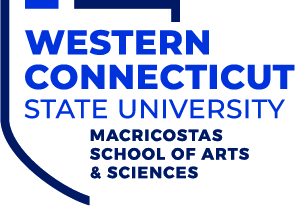
Dr. Katherine Allocco
Chair of the Women’s Studies Program
Professor, History
This is the second in a series of faculty interviews conducted and written by talented WCSU MFA student, John Bonanni. Our goal is to celebrate and learn from some of WCSU’s dedicated teachers and scholars.
Dr. Katherine Allocco credits her upbringing in a historically vintage revolutionary town in New Jersey as the root of her passion for history. Her extensive research in the study of medieval women and their empowerment options delivers a relevant, erudite feminism that transcends reactionary and activist responses to the subject. This is especially significant for contemporary female students who have been awakened to self-determination yet lack the tools to apply it to their daily lives. Dr. Allocco achieves a connection to this gap by creating an interactive program requiring students to select female historical figures and research the social, political and economic environment of the era in which they lived. This concept of historicism allows the student to gain a more accurate understanding of the challenges and opportunities afforded women in a medieval environment. Students are exposed to a well-researched, formal methodology providing details employed by women in the timeframe. Feminine management and leadership skills attributable to men at a time when the feminine gender served medieval social and economic patriarchal structures are explored and discussed.
Though the study of historical feminine empowerment may seem distanced from the general assumption that university study is a direct perquisite for higher economic and social quality of life, Dr. Allocco’s underlying objective is to inspire women to attend college beyond available job-seeking goals and experience intellectual enlightenment and self-development. She feels the task requires direct, relational interactivity between subject matter and student, and she delivers the theater to implement the concept by inviting students to pick a female medieval individual, research and explore the cultural environment around their daily life, and produce an in-class presentation of their findings. The activity provides a comprehensive, accurate historical context to historical individuals whose identities would otherwise be relegated to existing literary references.
The historical, gender-centered focus includes the high-profile women of history, like Joan of Arc and Guinevere, but it also explores the management and leadership capacities of lesser known individuals like Katarina von Bora, a former nun and wife of Martin Luther and Cristina, a murderess who succeeded in petitioning Queen Isabella for a pardon. Though the narrative of these individuals is educational, it is the discovery of effective negotiation, shrewd management, and significant influence of these medieval women within a gender-restricted society that defines their importance and relevance for the contemporary student.
Dr. Allocco suggests the students’ dearth of international experiences can also be alleviated by independent study. She points out the successful outcomes of students that have been exposed to on site history with field exploration where historical, evidential paradigms of Western civilization can be explored. Students benefitted from a recent trip to Ireland and England, producing for one individual a choice in their academic discipline.
The professor is not a proponent of online teaching primarily because of the non-interactive design of the process. She cites that connection between students is reduced, since students naturally shy away from reaching out, and loss of control of reliable research sources cannot guarantee accurate suitability of findings. The students are “alone, not connecting with people.” She feels the practice is a symptom of “living in a post-humanistic world,” and the challenge for connection is increasingly difficult.
Dr. Allocco suggests that women need to “find themselves, know who you are,” before settling for available careers. Her multidisciplinary design of History and Women’s Studies imparts pertinent knowledge of the invention and innovation of women who lived ages before us. For students, especially young women, the experience may be just the perfect underpinning to establish one’s own self-determination.
Interview conducted by John Bonanni & Ronald Samul
Author Bio: John Bonanni spent the last forty years in the theatre on tour, on Broadway, at Radio City Music Hall and many places in between managing every sensitive personality he encountered. He now writes about them, among other things. His articles have appeared in Adelaide Literary Magazine, Inspired Living Magazine, and Senior Outlook Today. He is currently enrolled in the MFA in Creative and Professional Program at Western Connecticut State University. theliteraryfish@gmail.com